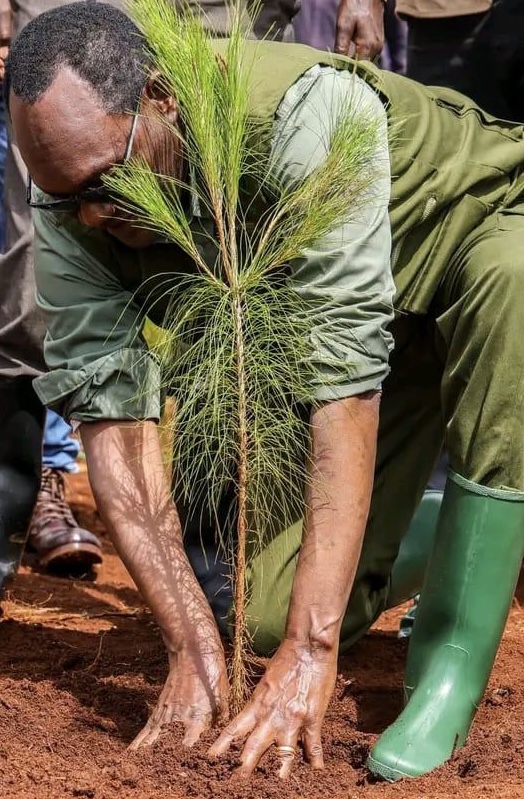
The government will fence off Kaptagat Forest in Elgeyo Marakwet after President William Ruto supported conservation of the key water tower.
Some communities have
criticised the fencing plan, notably cattlemen who let their animals over-graze
in the forest.
Ruto visited the region on Saturday, however, and explained to
residents the importance of enclosing and protecting the forest. They
overwhelmingly agreed.
He presided over the ninth edition of the Kaptagat Forest
Integrated Conservation Programme spearheaded by Treasury PS Chris Kiptoo.
“We have done the fencing around all other major forests in the
country and it’s important we do the same for Kaptagat to strengthen ongoing
conservation efforts,” Ruto said.
He praised Kiptoo for the fencing initiative, saying it has
greatly helped to stop degradation of the forest where widespread over-grazing
has contributed to destruction of tree seedlings planted to restore the
woodland.
The fencing will extend more than 285 kilometres around the
water tower.
So far, more than two million tree seedlings have been replanted
in the reclamation initiative adopted by most local communities and partner
organisations.
Resident Daniel Kibet said he feared for the future of the water
tower due to degradation over the years.
“I have seen so many trees now planted under this project headed
by PS Kiptoo and I am happy the forest will continue to exist for our future
generations,” Kibet said.
To discourage residents from fetching firewood, the programme
also instals biogas for homestead cooking to replace dependence on wood fuel.
The programme is aligned with Ruto’s call to mitigate the damage
of climate change by planting 15 billion trees on more than 27 million acres
(11 million hectares) in every part of Kenya to achieve 30 per cent tree cover
by 2032.
The conservation is part of a five-year programme (2024-29) to
improve community livelihoods and secure the Kaptagat ecosystem. It provides
community user rights through livestock upgrading, providing water and green
energy and distributing high-value crops and seedlings.
Many residents are optimistic about restoring the degraded
forest, and said their livelihoods have improved through avocado farming and
diversification away from traditional cereals cultivation.
Kaptagat Community Forest Association (CFA) chairman Vincent
Chelimo said the restoration is being achieved through a meticulous management
plan bringing together the state and private sector.
“The community is marshalled to join CFAs to enjoy user rights,”
he said. They include tilling forestland as they nurture tree seedlings,
receiving avocado seedlings and receiving biogas for cooking.
“In less than a decade, the forest that was a shell of former
self is now being restored,” Chelimo said.
The Plantation Establishment Livelihood Investment Scheme (Pelis)
provides planting food crops in selected forest areas. In those places, there
has been a rapid growth of trees, compared with uncultivated areas.
“Each year we have been planting more than 300,000 indigenous
trees with a success rate of 95 per cent. The effect is that once-dry rivers
are now flowing back to life, an indicator of successful conservation and
thriving biodiversity,” Chelimo said.
Sabor CFA secretary Francis Kangogo said the programme aims to
instal biogas in 28,000 households to greatly reduce tree felling for fuel
“All communities surrounding the forest have been identified to
benefit and biogas installation will completely alleviate wood fuel,” he said.
“Only if the communities around the forest are benefiting
directly and improving economically will conservation succeed.”
Kangogo said millions of shillings have been injected into the
Kaptagat landscape economy between 2017 and 2024 through tree seedlings
procurement and establishment of nurseries owned by the CFAs, women, youth, and
persons with disabilities.

















